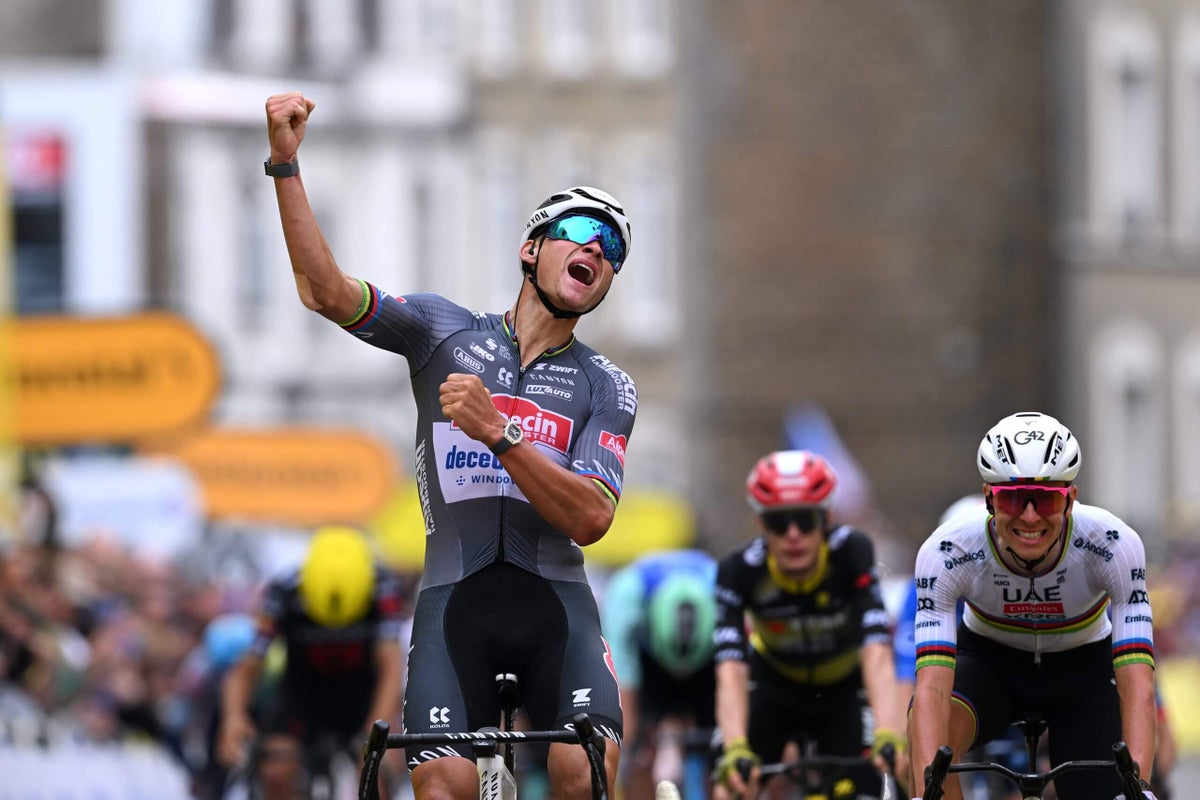Mathieu van der Poel made it two wins from two stages for Alpecin-Deceuninck at the 2025 Tour de France, winning a frantic stage into Boulogne-sur-Mer on Sunday afternoon and taking over the race lead from his team-mate Jasper Philipsen.
Overall race favorites Tadej Pogacar and Jonas Vingegaard finished second and third respectively.
After the wind had played a decisive role in stage one, the race was greeted by torrential rain in the start town of Lauwin-Planque on Sunday, a downpour that delayed the start and made the first hour of racing a pretty miserable affair for the riders.
The day’s breakaway consisted of four riders — Bruno Armirail, Yevgeniy Fedorov, Brent Van Moer and Andreas Leknessund — and the peloton was more than happy for them to plug away at the front, eventually catching them shortly after the intermediate sprint, a point of the race that generated some minor drama between the sprinters.
That regrouping ushered in a frantic final 50 kilometres, with the GC leaders moving to the front on the third category Côte du Haut Pichot and then maintaining a furious pace into the foot of the Côte de Saint-Étienne-au-Mont and then again into the Côte d’Outreau.
But it was the final climb to the finish where the real fireworks took place, with Red Bull-BORA-Hansgrohe’s Florian Lipowitz going clear, then a popular — if brief — attack from Tudor Cycling’s Julian Alaphilippe inside the final kilometer, before Van der Poel went full Van der Poel, outsprinting Pogacar to take both the win and the yellow jersey.
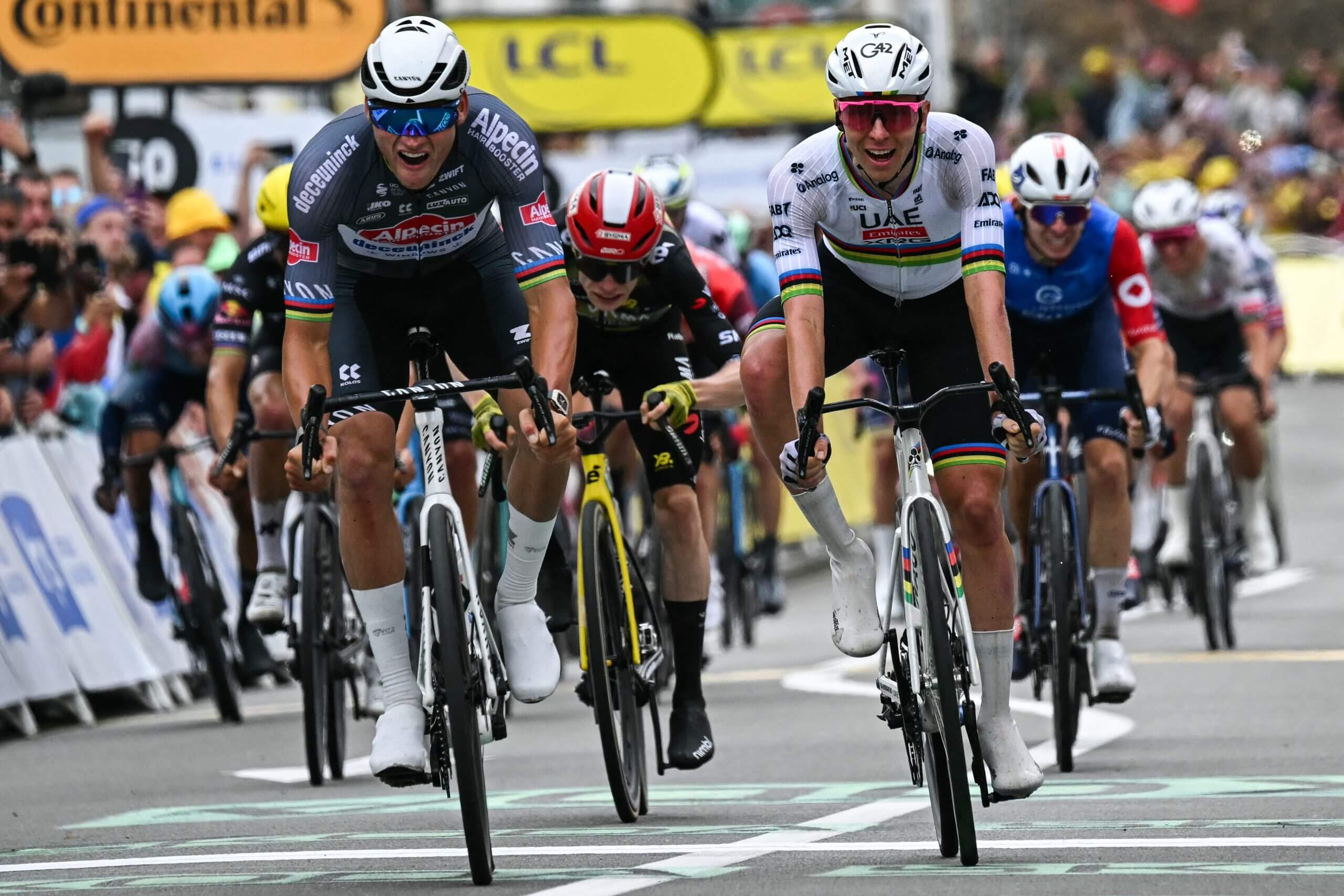
(Loic Venance/AFP via Getty Images)
Jacob Whitehead and Tim Spiers look back at the key moments from Sunday’s stage.
Find all of The Athletic’s Tour de France coverage here: nytimes.com/athletic/tag/cycling
Van der Poel moves into yellow on stage two — just as in 2021
When Van der Poel led out Pogacar with 500 meters to go, it looked as if he was generating the perfect setup for the Slovenian to ride into yellow.
The finish was uphill and draining, plus the final 15 km had been raced at a furious pace which had cracked the peloton into several groups. Surely Van der Poel couldn’t hold Pogacar off?
That he did with a wheel to spare confirmed his superhero status. He led out the sprint and then won it, beating Pogacar into second place for the third time this season, after doing so at Milan-San Remo and Paris-Roubaix.
It was only the Dutchman’s second Tour stage win. As with his first in 2021, it came on stage two and once again it put him into the yellow jersey.
That means Van der Poel has twice achieved something his grandfather — French cycling legend Raymond Poulidor — never managed.
Despite Poulidor winning seven Tour de France stages and finishing in the top 10 on 11 occasions in the 1960s and 1970s, he was never able to pull on cycling’s most prestigious item of clothing.
Mathieu back in yellow 4 years later 💛
Mathieu de retour en Jaune 4 ans après 🫶#TDF2025 l @MaillotjauneLCL pic.twitter.com/aTyIlp8WxE
— Tour de France™ (@LeTour) July 6, 2025
Van der Poel collapsed on the ground at the finish line, having completely drained himself in pushing back the tide of not only Pogacar but Vingegaard too.
“He’s too fast for me,” Pogacar conceded after the race.
The win was made all the more impressive by the fact Van der Poel — who had powered the pack up the final categorized climb of the day three km out — couldn’t even see the finish line until late, with a right-hander taking the peloton onto the short final straight, meaning he had to time his effort to perfection.
▶️ Relive the electric last km of stage 2 won by 🇳🇱 @mathieuvdpoel 💪
▶️ Revivez le dernier kilomètre explosif de l’étape 2 remportée par 🇳🇱 @mathieuvdpoel 💪#TDF2025 | @Continental_fr pic.twitter.com/IVCBHL95Ya
— Tour de France™ (@LeTour) July 6, 2025
“It was super difficult, the final was actually harder than I thought,” he said.
“I was really motivated. It’s been four years since I won my first stage on the Tour de France so it was about time I won a second one.
“People put me as a favourite (for the stage) but if you see which riders were in front on the climbs, I did a really good job today to be there.
“The climbs were harder than I expected, it was a hard pace as well, you saw the second-to-last climb there were maybe three guys left on top.
“It’s a dream for the team, the first two days… everything else that comes now is just a bonus.”
Tim Spiers
Vingegaard aggression a new chapter in Pogacar rivalry
The day before the 2025 Tour de France began, Vingegaard sat in a cramped room and insisted to 100 journalists that this was a new version of the Tour de France champion before them.
“I’m more heavy now than I was last year, but it’s muscle and it gives a lot more power. Let’s see if that’s enough,” he said.
Its purpose? In the past, Vingegaard has been criticised for passivity, for waiting too long to attack. Emerging as a wispy climber, his (relatively) heavier-set rival Pogacar, in contrast, will attack for any bonus seconds, on any stage.
Under the Dane’s prior perspective, when you have the strongest team, why open yourself up to unnecessary risk?
Perhaps it is because, strength-wise, UAE Team Emirates’ squad now matches Visma-Lease a Bike’s, but at some stage, Vingegaard’s strategy has changed.
On stage one, his effort split the peloton in the crosswinds, causing Remco Evenepoel and Primoz Roglic to lose time.
On Sunday, he attacked on a downhill with five km to go, attempting to gap Pogacar. Though the group eventually came back together, it showed Vingegaard’s continued intent — he then finished third in the sprint behind Van der Poel and Pogacar.
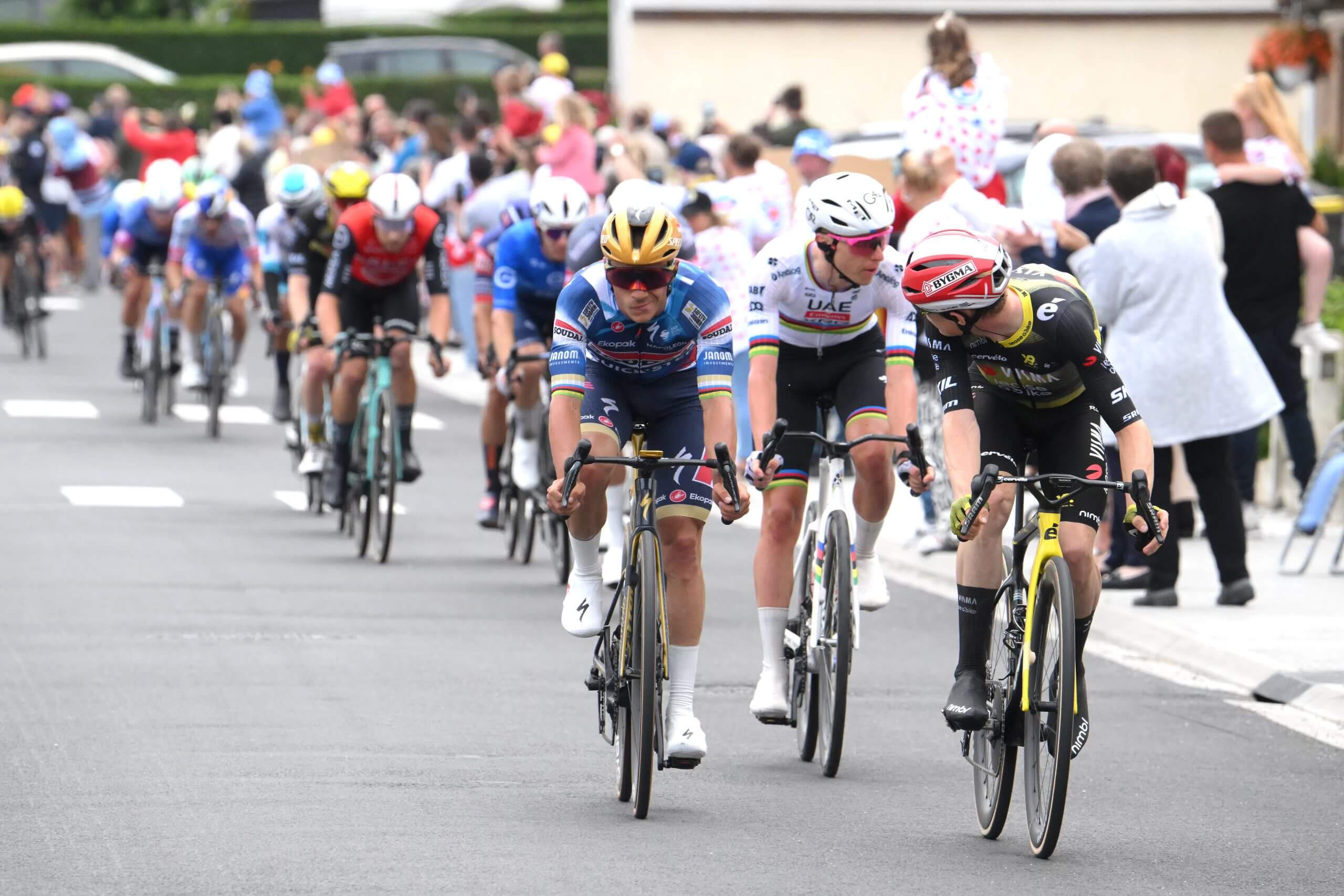
Vingegaard surveys the result of some of his new-found aggression on the Cote d’Outreau during stage two. (Bernard Papon – Pool / Getty Images)
Asked what was behind the shift in attitudes, his team boss Grischa Niermann was blunt.
“Yeah I think he’s just f***ing good,” he replied. “I think he can go anywhere.”
“I did it for fun!” Vingegaard shouted over the top of him, from his warm-down bike.
Back at the Visma team bus, there was optimism at their proactive team leader. The plan, originally, had been to ride for Wout van Aert, before his lack of form on the day switched plans towards Vingegaard.
“You’re a sprinter now,” joked his American teammate Matteo Jorgenson. “I like it. You said in the press conference you were huge, so you have to back it up now.”
“You don’t grow this for nothing,” Vingegaard replied. The iconic Mûr-de-Bretagne on stage seven will be next opportunity to see just how significant that growth has been.
Jacob Whitehead
Lauwin-Planque’s big day turns into a damp squib
The Tour de France hates being late. The race derives so much income from television revenue that any shift to the schedule is an abhorrence. On stage two, in the small French village of Lauwin-Planque, they had no choice.
At 12.05pm local time, just ten minutes before the planned start, the Red Bull-BORA-Hansgrohe bus was still mired in traffic. They were last in the queue, but they were just one team of many — of 23 teams at the race, only Astana and Bahrain-Victorious arrived at anything approaching ‘on time’.
Think a few of us might be late to the stage start today 😅 #TDF2025 pic.twitter.com/Ax18Zi2EWu
— EF Pro Cycling (@EFprocycling) July 6, 2025
The issue? Lauwin-Planque’s road system had been overwhelmed by a thunderstorm which had dumped both a foot of rain and a fleet of cars on the town. The Tour is keen to retain stage starts in these villages, a nod to French cycling’s rural tradition. But their charm is also the issue — one road in, one road out. The roots of the sport were not watered here, but drowned.
It left the stars of the peloton, Pogacar and Vingegaard alike, rushing out their buses to strap on their rain jackets and adjust their bikes.
The Tour’s caravan is growing exponentially, and at some point race organisers will have a choice to make. What are they willing to give up? To trim back the size of the race, including money-spinning VIP areas, or its unique pastoral idyll?
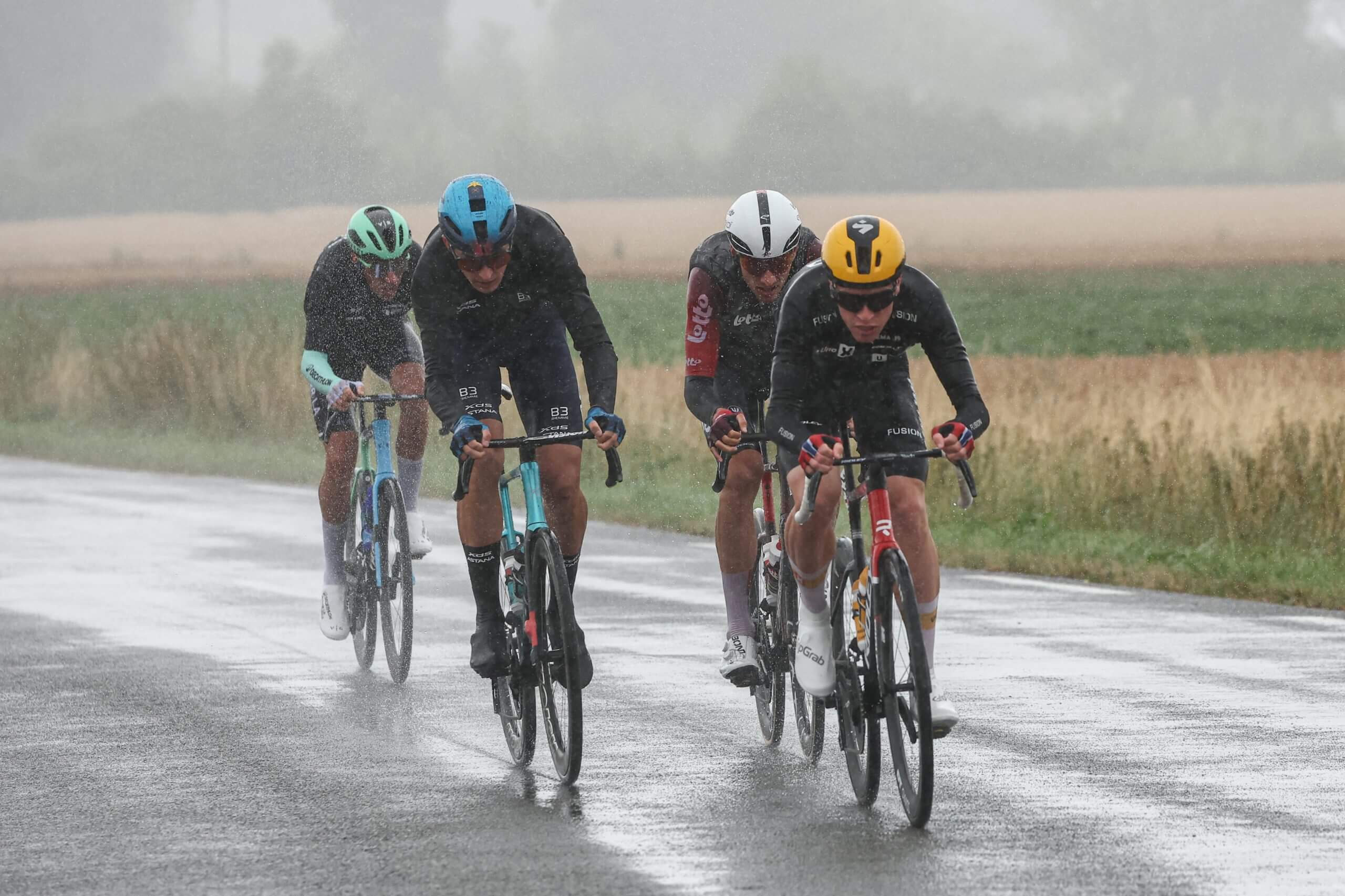
The day’s break contend with the wet conditions at the start of stage two. (Anne-Christine Poujoulat / AFP via Getty Images)
Jacob Whitehead
What went on at the intermediate sprint?
It’s been a high-octane, high-pressure opening two days of the race with nervous riders and stressed teams terrified to get caught on the wrong side of splits, or get involved in a crash, or miss their big shot at a stage win.
Still, it was slightly peculiar to see Jonathan Milan completely blow his top after a minor altercation in the dash for, well, fifth place in an intermediate sprint.
Milan even won the sprint to pick up 11 points in the battle for the green jersey, pipping Tim Merlier and Biniam Girmay in a three-pronged dead heat.
However, Milan was apoplectic with Girmay for leaving out a rigid elbow as the pair jostled for position a few yards from the line. Milan then responded by leaning into Girmay’s line and even nicking his team-mate’s wheel.
After the pair sat up, Milan furiously gesticulated at Girmay, waving his arm and pinching his fingers against his thumb in a manner that can only be described as extremely Italian.
Intermediate sprint drama with Jonathan Milan pushing Biniam Girmay off his teammate’s wheel with 500m to go.#TDF2025 📺: Peacock pic.twitter.com/mxxheMLUne
— NBC Sports Cycling (@NBCSCycling) July 6, 2025
It was all a reflection not just on the remarkable intensity of the first couple of days, but also Milan’s frustration at having dropped the ball on day one when missing the late split in the peloton.
But it was also a bit daft — and summed up perfectly by Girmay’s Intermarche-Wanty team on social media.
Apparently Milan is not happy that Bini eats pizza with pineapples 🤷♂️ https://t.co/Gm23IdBw2y
— Intermarché-Wanty (@IntermarcheW) July 6, 2025
The minor nature of the incident was only underlined further by a swift apology from Milan to Girmay at the end of the stage.
Tim Spiers
Theft leaves Cofidis on brink of disaster
In the small hours of Sunday morning, Cofidis’ riders were recovering from stage one at their base near Lille.
Their workshop truck, parked nearby, had its door forced open — and 11 bikes stolen from its load.
“The Cofidis team strongly condemns this act of incivility and calls on the perpetrators to be civic-minded and responsible,” the team said in a statement.
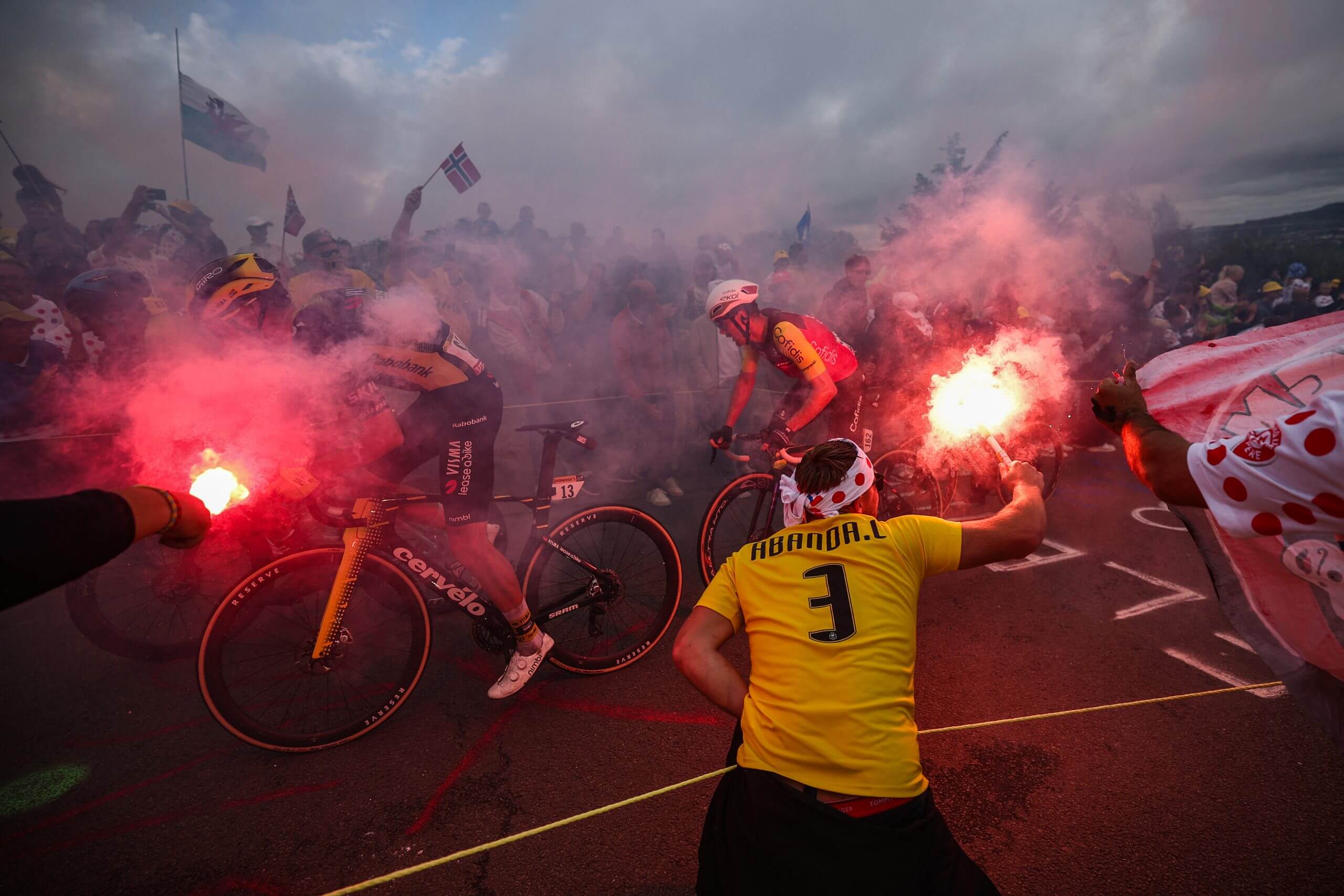
Cofidis’ Spanish rider Alex Aranburu pictured during stage two. (Anne-Christine Poujoulat/AFP via Getty Images)
The modern peloton is a place of vast disparities — and Cofidis, as one of the poorest teams in the sport, are particularly vulnerable to what amounts to a theft worth well into five figures in euros.
It was only because their team is based in Bondues, just north of Lille, that the team was able to avoid serious difficulties and source bikes for the second stage.
Jacob Whitehead
What’s coming up tomorrow?
Stage 3, Monday July 7: Valenciennes — Dunkerque, 178km, flat
Another stage for the pure sprinters, but the jeopardy will once again be provided by the possibility of crosswinds. GC teams will need to stay near the front because of this, which will once again make the closing kilometres extremely stressful.
(Top photo: Getty Images)
